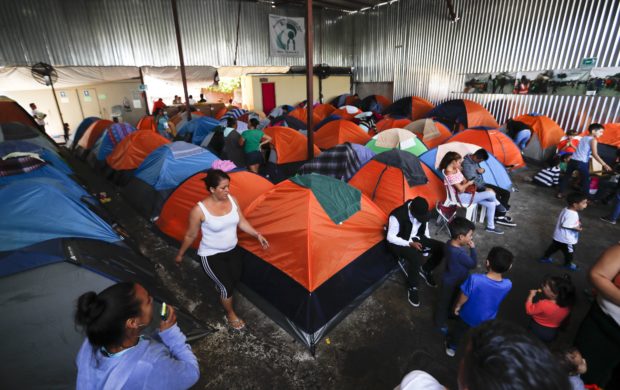Central American migrants say deal doesn’t dash asylum hopes
TIJUANA, Mexico – At the small migrant Juventud 2000 shelter near the border, a Honduran expressed disappointment Sunday over the agreement between Mexico and the United States to more aggressively curtail migration from Central America.
But Edwin Sabillon Orellana of Honduras said he and his family will stick with their effort to seek asylum in the U.S.
Sabillon said some migrants might decide that waiting in Mexico for the lengthy processing of asylum requests isn’t worth it, but he said he cannot take his family back to their home near San Pedro Sula, a crime-ridden metropolis that is Honduras’ second biggest city.

Tents fill a shelter used mostly by Mexican and Central American migrants who are applying for asylum in the U.S., on the border in Tijuana, Mexico, Sunday, June 9, 2019. The mechanism that allows the U.S. to send migrants seeking asylum back to Mexico to await resolution of their process has been running in Tijuana since January. (AP Photo/Eduardo Verdugo)
“In my dreams I never had it in my mind to one day come to the United States,” the 30-year old assembly plant worker said, sitting near a large pot of half-made salsa ranchera awaiting a delivery of cooking gas to the shelter’s kitchen.
“I had my job, my wife had her job. My daughter was in a bilingual school — my daughter speaks English. I didn’t have a reason to come here.”
That all changed in April when one of the street gangs plaguing Honduras and other Central American countries gave him a deadline of five days to begin paying a monthly extortion fee of about $120, Sabillon said.
Article continues after this advertisementHe said the gangsters thought he could pay because his daughter went to a good school, but she was on scholarship.
Article continues after this advertisementThe family earned enough only to keep food on the table and pay the utilities, he said.
Two days before the deadline, Sabillon slipped away in the middle of the night with his wife and 8-year-old daughter and left Honduras.
It took them about two weeks to reach Tijuana, across the border from San Diego.
They quickly crossed into the U.S. illegally near Tijuana’s beach and asked for asylum.
After five days in detention they were sent back to Tijuana at night with an appointment to return later this month.
The mechanism that allows the U.S. to send migrants seeking asylum back to Mexico to await resolution of their cases has been running in Tijuana since January.
One part of Friday’s agreement between Mexico and the U.S. to head off the threat of U.S. tariffs on all imports from Mexico was an expansion of that program along the entire border.
As of last week, about 10,000 asylum seekers had been returned to Mexico, according to Mexican officials.
So far the program has been operating only in California and in El Paso, Texas. It is currently being challenged in U.S. courts.
Mexico has offered opportunities for Central American migrants like Sabillon to legalize their status so they can work while waiting or if they decide to stay in Mexico. But he is not interested.
Most Mexicans are good people, he said, but some curse migrants in the street.
On Saturday, he took his family to hear Mexican President Andrés Manuel López Obrador speak at a rally in downtown Tijuana.
He wasn’t able to hear the president’s words about respecting migrants’ human rights because the crowd around him got worked up after a woman shouted, “Mexicans first and those from the caravan can go to …,” he said, not repeating the profanity.
“That hurts us a lot,” he said.
Sabillon is at least in the fortunate position of having his U.S. court date just a couple weeks away.
Nearby, at one of the city’s principal crossings to the U.S., dozens of migrants — mostly Haitians — waited in line for a number that would determine when they could cross to the U.S. to request asylum.
On Sunday, U.S. border officers announced only two numbers and people who got their numbers in the past week were some 700 places away from the numbers being called, suggesting a wait of many months ahead.
Back at the Juventud 2000 shelter, Luis Torres and other parents killed time watching over the dozens of kids playing in the cramped space between tightly packed tents.
The shelter, just one of many in Tijuana, is housing about 150 people, all families. Kids jumped rope and chased each other between tents. /gg